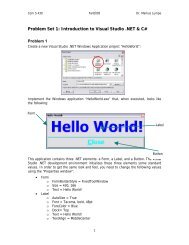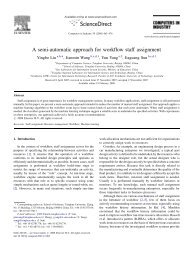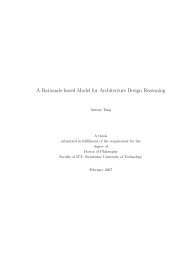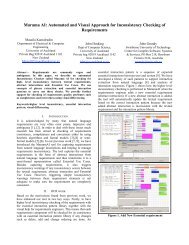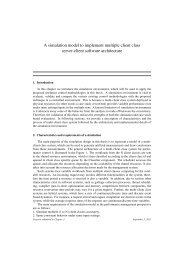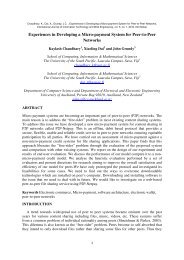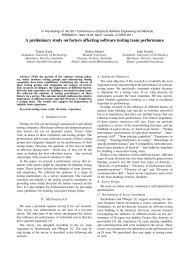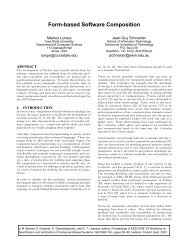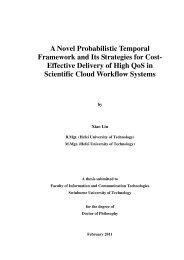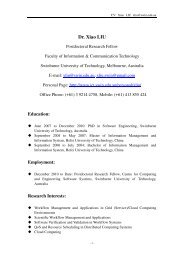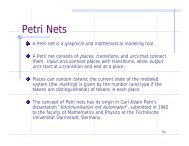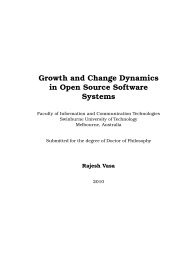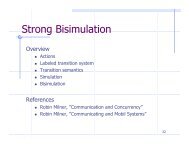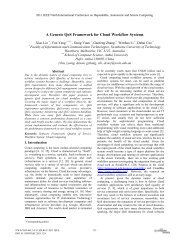Workshop proceeding - final.pdf - Faculty of Information and ...
Workshop proceeding - final.pdf - Faculty of Information and ...
Workshop proceeding - final.pdf - Faculty of Information and ...
You also want an ePaper? Increase the reach of your titles
YUMPU automatically turns print PDFs into web optimized ePapers that Google loves.
associated with a reinvention <strong>of</strong> institutions governing industrial relations <strong>and</strong> labor management,<br />
which have inevitably involved the creation <strong>of</strong> more conventional labour market (Shen, 2008; Frenkel<br />
<strong>and</strong> Kuruvilla, 2002). Consistent with the more general policy orientation toward market<br />
liberalization, these policy shifts were aimed at creating a free labour market <strong>and</strong> enabling individual<br />
enterprises to determine a broad range <strong>of</strong> issues at the workplace level, including recruitment <strong>and</strong><br />
dismissal, wages <strong>and</strong> other forms <strong>of</strong> remuneration, <strong>and</strong> investments in training –see Table 1 for a<br />
summary <strong>of</strong> major labour law reforms. These reforms have not only altered the structure <strong>and</strong> dynamics<br />
<strong>of</strong> China’s economy, but have also pr<strong>of</strong>oundly altered the exposure <strong>of</strong> workers to market risk. In this<br />
context our aim is to consider the emergence <strong>of</strong> new forms <strong>of</strong> union organisation as a<br />
‘countermovement’ against the extension <strong>of</strong> the market, providing workers with new forms <strong>of</strong> social<br />
protection.<br />
Table 1. Summary <strong>of</strong> Main Labour Law Reforms in China, 1992-2008<br />
Law/Regulations<br />
Major Contribution<br />
Labour Union Law (1992)<br />
Stipulating the status, obligations <strong>and</strong> rights <strong>of</strong> trade union in<br />
new economic system<br />
Regulations On Enterprises Labour<br />
Disputes Settlement(1993)<br />
Labour Law (1994)<br />
Labour Union Law (2001)<br />
Labour Contract Law (2008)<br />
Labour Dispute, Mediation <strong>and</strong><br />
Arbitration Law (2008)<br />
Setting up framework for labour dispute resolution in new<br />
economic system<br />
Basic legal rules for labour market <strong>and</strong> <strong>of</strong> labour relations<br />
mediation<br />
More emphasis on unions’ role <strong>of</strong> worker representation <strong>and</strong><br />
participation in labour process<br />
More pro-labour provisions:<br />
-Workplace <strong>and</strong> occupational health provisions;<br />
-Work time <strong>and</strong> holiday provisions;<br />
-Compensative payment for pre-maturity contract<br />
termination.<br />
Provisions to make arbitration procedures more accessible:<br />
-Arbitration terminated in the first instance;<br />
-Free <strong>of</strong> charge for arbitration;<br />
-Employers have more ‘burden <strong>of</strong> pro<strong>of</strong>’ responsibilities in<br />
arbitration.<br />
The Role <strong>of</strong> Unions in Socialist China<br />
The peak union organization, the All-China Federation <strong>of</strong> Trade Union (ACFTU) was established<br />
as the formal union movements under the leadership <strong>of</strong> the Communist Party <strong>of</strong> Chinese (CPC<br />
hereafter), <strong>and</strong> incorporated other union movements. Officially, “the trade unions <strong>of</strong> China are a<br />
voluntarily organized mass organizations <strong>of</strong> Chinese working class led by the CPC <strong>and</strong> formed by the<br />
staff <strong>and</strong> members voluntarily, are the bridges <strong>and</strong> transmission belt linking the Party <strong>and</strong> the masses<br />
<strong>of</strong> workers <strong>and</strong> staff members, are the important social pillar <strong>of</strong> the state power, <strong>and</strong> are the<br />
representatives <strong>of</strong> the interests <strong>of</strong> the trade union members workers <strong>and</strong> staff” (Chinese Union Charter,<br />
2003).<br />
The ACFTU formally functions as both a representative institution <strong>of</strong> workers <strong>and</strong> a state<br />
institution. In private workplaces, grassroots unions are largely affiliated to the management (Shen,<br />
2007, p.236-237). Chinese unions assumed three objectives:<br />
1) to assist state administrative function;<br />
2) to collaborate with enterprise management to improve production efficiency; <strong>and</strong><br />
3) to represent <strong>and</strong> protect the interests <strong>of</strong> employees (Ge, 2007, p.2).<br />
All trade union organisations at the provincial, local <strong>and</strong> workplace levels are required by<br />
law to be affiliated to the ACFTU.<br />
134



